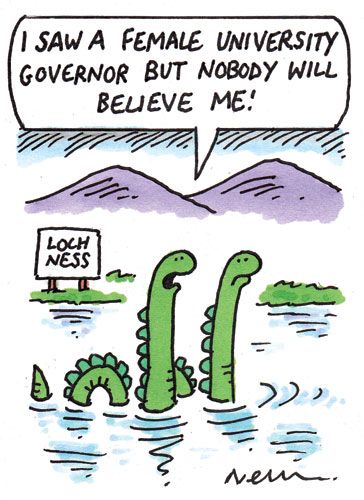
- Times are tough for students in these days of £9,000 fees - so tough that they have to rely on universities for their drugs. King’s College London “has offered students the chance to take part in a clinical trial…by taking COCAINE”, The Sun shouted on 23 February. Prospective participants were promised “reasonable financial compensation” in return for helping researchers to study the drug’s effects on the body, and were told that they would be taking the drug through “nasal admission”. Any financial help for students is not to be sniffed at, but given the social make-up of Russell Group universities such as King’s, the students should at least be able to provide their own £20 notes.
- Scottish universities have been accused of perpetuating “gender inequality right out of Victorian times” after figures showed that women constitute only 25 per cent of governing body members despite making up more than half the academic workforce. The Herald reported the analysis, by NUS Scotland, on 26 February. Alastair Sim, director of Universities Scotland, said in response that all university governing bodies “have staff and student representatives who are elected by their peers and whose gender diversity reflects their electorates’ choices about who is the best individual for the role”. He noted that all university chairs “happen to be men at the moment” - a remarkable coincidence indeed. And he concluded that gender balance is “also an issue that NUS Scotland has had to deal with, as only one-quarter of its presidents since 1971 have been women”. Full marks to Mr Sim for managing to dig himself into a hole while simultaneously fanning the flames.
- Your heart might sink yet further on hearing that Business Insider published a list of 50 of “The Sexiest Scientists Alive!” on 25 February. Well, rejoice, because the website ensured a 50-50 male-female split. Scottish universities, you could learn a thing or two from these people. The coveted top spot was taken by “space hunk” Bobak Ferdowsi, systems engineer and flight director for the Mars Curiosity rover at Nasa’s Jet Propulsion Laboratory. In second place was Harvard University’s Lisa Randall, “considered to be one of the nation’s foremost theoretical physicists” - and equally importantly, a blonde. Professor Randall even agreed to an interview with the website, saying of its list: “Once you’ve achieved enough it’s not worth worrying about. When you’re older, it’s actually flattering.” Is hotness part of the research excellence framework?
- New research funded by US taxpayers must be made available to the public free of charge within a year of its publication, the Obama administration has said in a major boost for the open access movement. “Americans should have easy access to the results of research they help support,” said John Holdren, head of the president’s Office of Science and Technology Policy, in a response to a petition urging the public release of taxpayer-funded studies, Inside Higher Ed reported on 26 February. The Association of American Publishers called the White House directive “reasonable” and “balanced”, after previously objecting to a Congressional bill on open access as a “boondoggle” - a term describing money-wasting projects that ranks alongside “filibuster”, “pork-barreling” and “logrolling” as the strangest and best terms in American political vocabulary.
- The government has sparked anger by rejecting MPs’ calls to exclude overseas students from the net migration count. The Business, Innovation and Skills Committee and four other parliamentary committees said students should be withdrawn from the count, thus sparing universities the impact of the government’s drive to cut net migration. In a response published on 26 February, the government said that the UK “will continue to comply with the international definition of net migration”, which classes students as migrants. But Adrian Bailey, chair of the BIS committee, hit back the same day, criticising the government for failing to offer anything new. “Our report called for urgent action,” he said. “The government replies with a response that is almost four months late. This is not acceptable.” The BIS committee was scheduled to meet and agree a formal response to the government on February.